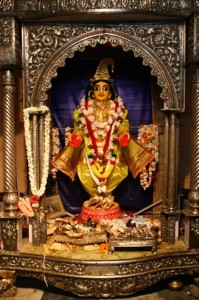The Eighth Offense
“dharma-vrata-tyâga-hutâdi sarva-shubha-kriyâ-sâmyam-api-pramâdah”
Meaning – “It is an offense to equate the result of the Holy Name with the outcomes of righteous conduct, fasting, sacrifices, and other religious activities.’
This belittles the glory of the Holy Name, hence an offense. All the pious activities listed in the scriptures are material in nature, whereas the divine name is transcendental and indestructible. The pious activities are merely the means to attain heavenly comforts. They cannot be the goal. On the other hand, the Holy Name reaches us to the goal (eternal love) and is also the goal itself. Thus how can we consider Râgânugâ any good act equal to Harinâm? In fact, the good acts grant us some miniscule fruits – if we pray to the Holy Name for the same results – we commit an offense, since this means we are equating the Holy Name with those pious activities.
Srimat Jiva Goswâmipâd has said –
“Sri Harinâm is independent and all-powerful. If we engage Him to bestow those small products that good karmas can give us, we are insulting Him. It is an offense.”
– (purport to Srimad-Bhâgavatam 6.2.10-22)
The Ninth Offense –
ashraddadhâne vimukhe’pi shrinvati yashchopadeshah shiva-nâmaparâdhâ –
Meaning – “It is an offense to instruct one to chant Harinâm if he is irreverent and is adverse to hearing the Holy Name.”
Faith and reverence are the prime requisites to enter the Bhakti-Mandir. Therefore only one who has shraddhâ is qualifies to chant the Holy Name. If we meet someone who has no respect for the Lord and disinterested to know the glory of the Holy Name we should not instruct such a person to chant. We should simply say – “Harinâm is above everything, it is the supreme most and if we chant the Holy Name all will benefit”. It is better to speak like this than directly saying – “You should chant the Mahâmantra.” We should give Harinâm only after we have tested that person’s faith. Otherwise we shall commit offense. The above verse states that if we instruct a faithless disrespectful person to chant, we are the offenders – and not the other person (for not having respect).
The Tenth Offense –
“shrute’pi-nâm-mâhâtmye yah pritirahito narah,
aham mamâdi paramo nâmni so’pâparâdhakrit.”
Meaning – “In spite of hearing the glory of Sri Harinâm, if we continue to think of the body as ‘I’ and body-related objects (persons) as ‘mine’ – and do not love the Holy Name – we commit an offense.”
This statement refers to the one whom a devotee is instructing to chant. When a devotee preaches the Holy Name to someone and if that person does not start chanting, he is committing an offense. This is because when we do not chant? When we take pride in our body that is highly destructible and consider ourselves the Lord and master of material possessions. It is then that we disregard the Holy Name and do not start chanting. In spite of hearing the vast greatness of the Holy Name when we do not chant it means that we are insulting Sri Nâm-Prabhu. A devotee too should not instruct such a person to chant.
(to be continued)


2 thoughts on “Chapter 10 : Can we beg tiny blessings from Harinam ?”